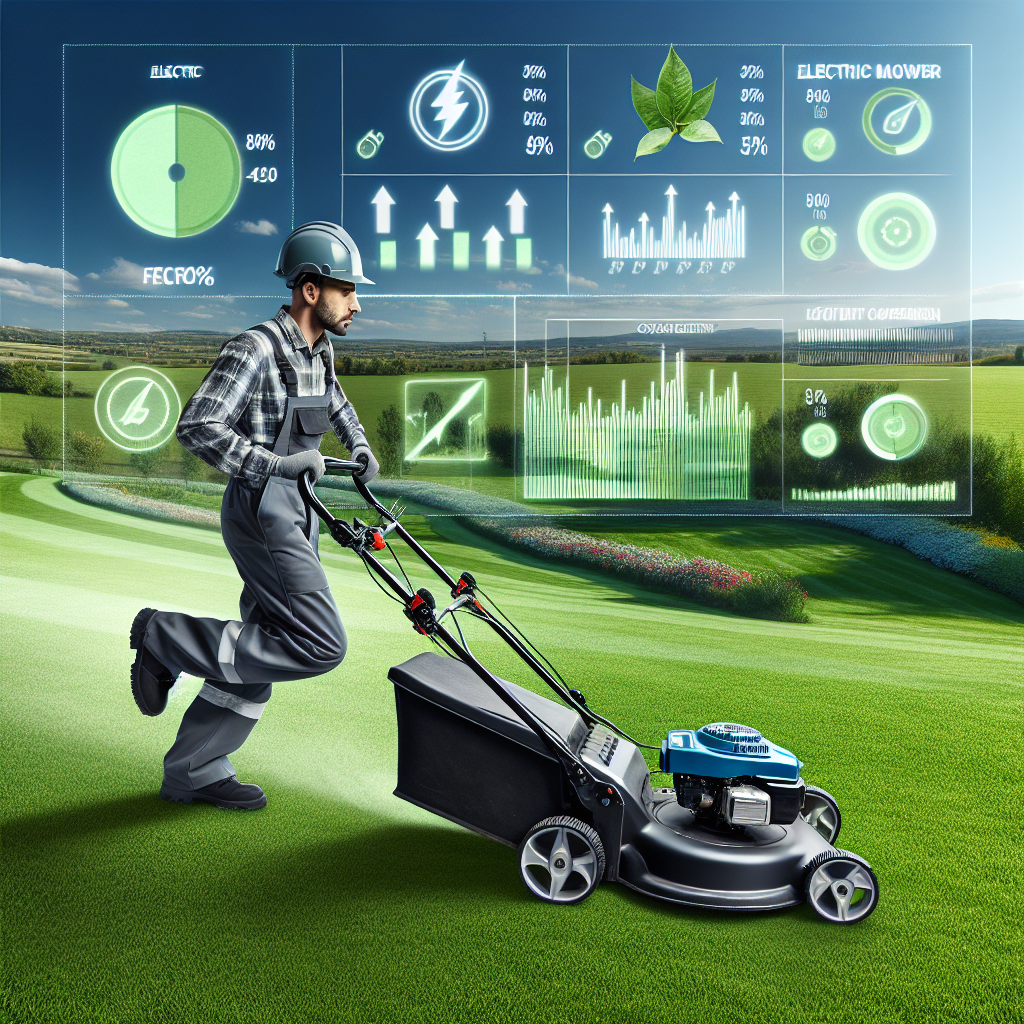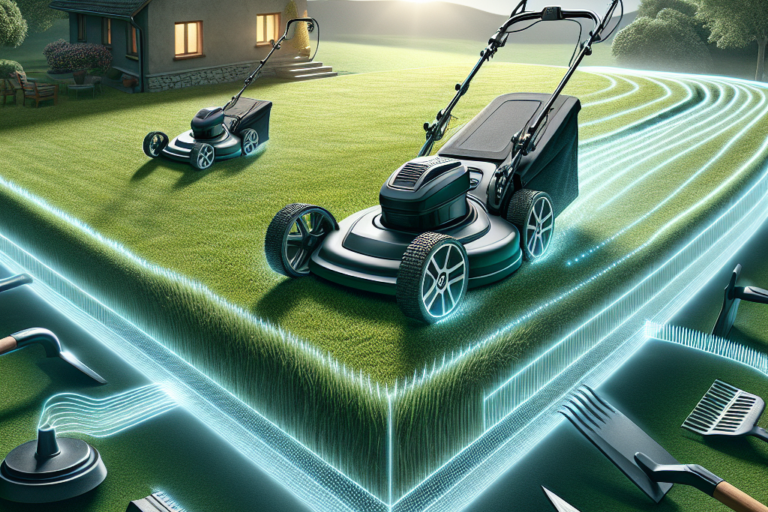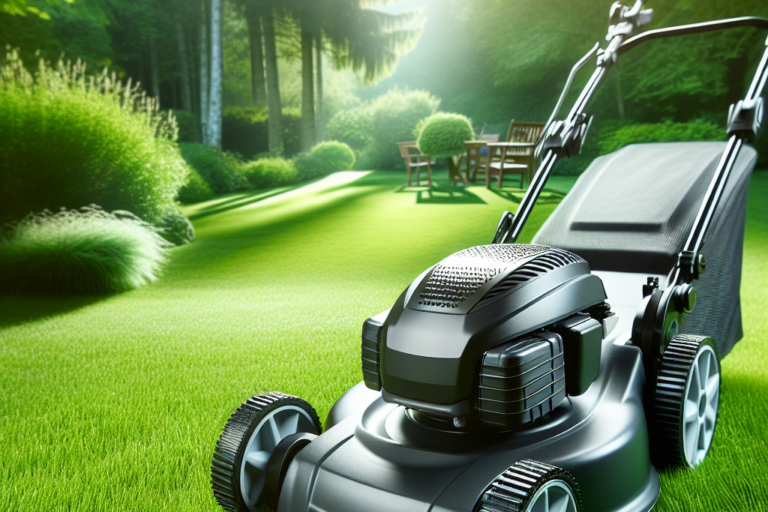If you’re a professional landscaper searching for an eco-friendly alternative to traditional gas-powered lawn mowers, you may be wondering if electric lawn mowers are a suitable option for your line of work. In this article, we will explore the potential of electric lawn mowers in professional landscaping services, discussing their capabilities, benefits, and considerations to help you make an informed decision. So, let’s dive into the world of electric lawn mowers and find out if they are the right fit for your business.

Benefits of Electric Lawn Mowers
Noise Reduction
One of the major advantages of electric lawn mowers is their noise reduction capability. Unlike traditional gas-powered mowers, electric mowers operate quietly, which can be a huge benefit for both the user and the surrounding environment. No more noisy engines disturbing the peace and tranquility of your neighborhood. With an electric mower, you can now mow your lawn early in the morning or late in the evening without worrying about waking up your neighbors or disrupting any outdoor activities.
Environmentally Friendly
Another significant benefit of electric lawn mowers is their eco-friendliness. By using electricity as their power source, these mowers emit zero emissions during operation, reducing their carbon footprint. If you are someone who cares deeply about the environment and wants to minimize your impact on it, then switching to an electric mower is an excellent choice. By opting for an electric mower, you can contribute to preserving air quality and reducing pollution, ultimately making a positive impact on the planet.
Cost-Effective
Electric lawn mowers also offer long-term cost savings compared to their gas-powered counterparts. While electric mowers might have a higher upfront cost, they make up for it through lower operational expenses. With electric mowers, you won’t need to buy and store gasoline, saving you money in the long run. Additionally, electric mowers require less maintenance, as they have fewer moving parts and don’t require oil changes. This means fewer trips to the repair shop and less money spent on maintenance and repairs.
Low Maintenance
Electric lawn mowers are known for their low maintenance requirements. Unlike gas-powered mowers that require regular oil changes, spark plug replacements, and air filter cleanings, electric mowers have a simpler maintenance routine. Typically, all you need to do is keep the mower clean, regularly sharpen the blades, and ensure proper battery maintenance. This not only saves you time and hassle but also reduces the overall cost of ownership.
Types of Electric Lawn Mowers
Corded Electric Lawn Mowers
Corded electric lawn mowers are powered by electricity and require a continuous power supply via an electric cord. These mowers are ideal for smaller lawns without too many obstacles. The cord limits their range, so using them on larger properties or areas with numerous trees or landscaping features can be challenging. However, corded electric mowers offer consistent power throughout the entire mowing session and eliminate the need for recharging batteries.
Cordless Battery-Powered Lawn Mowers
Cordless battery-powered lawn mowers are more versatile than their corded counterparts, as they are not restricted by the length of an electric cord. These mowers utilize rechargeable batteries, allowing for greater mobility and flexibility. They are perfect for medium to large-sized lawns and can handle various terrains and obstacles. However, one drawback is that their runtime is limited to the battery’s charge, which means you may need to recharge or replace batteries for longer mowing sessions.
Robotic Lawn Mowers
Robotic lawn mowers are the epitome of convenience and automation. These self-propelled mowers use built-in sensors to navigate and maintain your lawn automatically. Simply set the boundaries with a boundary wire, program the desired mowing schedule, and let the robot do the work for you. Robotic mowers are suitable for both small and large lawns and can handle complex landscapes. However, they can be on the pricier side and require initial setup and periodic maintenance.
Features Required for Professional Landscaping Services
Powerful Cutting Ability
When it comes to professional landscaping services, a powerful cutting ability is essential. Electric mowers designed for professional use should have robust motors and cutting systems that can handle extensive and frequent mowing. The cutting ability should be able to handle thick and dense grass without bogging down or leaving uneven patches. Look for mowers with high horsepower or voltage ratings to ensure the necessary cutting power.
Wide Cutting Width
Efficiency is crucial in professional landscaping, which is why having a wide cutting width is important. A larger cutting width allows you to cover more ground with each pass, reducing the time it takes to complete a job. Look for electric mowers with cutting widths of at least 20 inches or more to maximize productivity.
Adjustable Cutting Height
Different grass types and lawn conditions require varying cutting heights. The ability to adjust the cutting height is essential for achieving the desired lawn look and maintaining healthy grass. Look for electric mowers with multiple cutting height options, preferably with easy-to-use height adjustment mechanisms.
Durable Construction
Professional landscaping services involve heavy use of equipment, so durability is a key consideration. Look for electric mowers with sturdy construction and high-quality materials that can withstand regular and vigorous use. Stainless steel or reinforced cutting decks and robust frames are indicators of a durable mower.
Long Battery Life
Professional landscaping often involves extended periods of mowing, so having a long battery life is crucial. Look for electric mowers with batteries that can provide sufficient runtime to complete jobs without frequent recharging. Mowers equipped with high-capacity or dual batteries can be beneficial for longer working sessions.
Top Electric Lawn Mowers for Professional Landscaping Services
1. Greenworks Pro 80V Cordless Lawn Mower
The Greenworks Pro 80V Cordless Lawn Mower is a powerful option specifically designed for professional use. It features a robust brushless motor that delivers consistent performance and can handle tough grass conditions. With its 21-inch cutting width and adjustable cutting height, this mower offers both productivity and versatility. The 80V battery system ensures a longer runtime, allowing you to complete larger jobs without interruptions.
2. EGO Power+ Select Cut Mower
The EGO Power+ Select Cut Mower is another excellent choice for professional landscapers. It boasts a self-propelled feature, making it more effortless to maneuver, especially on larger properties. With its 56V battery system and 21-inch cutting width, this mower can handle demanding mowing tasks. The Select Cut System allows you to switch between bagging, mulching, or side discharge, providing flexibility to adapt to different lawn conditions.
3. DeWalt DCMW220P2 Cordless Lawn Mower
The DeWalt DCMW220P2 Cordless Lawn Mower offers power and durability for professional landscaping services. With a 20-inch cutting width and adjustable cutting height settings, it can efficiently tackle various grass lengths and thicknesses. Equipped with two 20V batteries, this mower provides sufficient runtime for extended work sessions. The sturdy construction ensures its longevity, even with heavy use.

Considerations Before Purchasing
Budget
Before purchasing an electric lawn mower for professional use, consider your budget. Electric mowers can have a higher upfront cost compared to gas-powered mowers, but they offer long-term cost savings. Determine how much you are willing to invest in a high-quality, professional-grade electric mower that meets your needs.
Size of Lawn
The size of your lawn is an important factor when choosing an electric mower. For small to medium-sized lawns, a corded electric mower or a cordless battery-powered mower with sufficient runtime may be suitable. For larger lawns, a cordless battery-powered mower with dual batteries or a robotic mower may be more practical.
Terrain and Obstacles
Take into account the terrain and obstacles present in your lawn. If you have uneven terrain or challenging obstacles like trees, flower beds, or rocks, consider a maneuverable mower with good traction and the ability to navigate around obstacles.
Accessories and Attachments
Consider any specific accessories or attachments that may be necessary for your professional landscaping services. Examples include bagging attachments, mulching kits, or additional batteries for cordless mowers. Ensure that the mower you choose is compatible with the accessories you require.
Maintenance and Care
Regular Cleaning
To keep your electric mower in optimal condition, regular cleaning is essential. After each use, remove any grass clippings or debris from the cutting deck and other components using a brush or compressed air. Also, make sure to keep the mower’s air vents and cooling fans clear of obstructions to prevent overheating.
Sharpening Blades
Maintaining sharp blades is crucial for achieving a clean and precise cut. Periodically inspect the cutting blades and sharpen them as needed. Dull blades can tear and damage the grass, leading to an unhealthy-looking lawn. Follow the manufacturer’s instructions or seek professional assistance for blade sharpening.
Battery Maintenance
For cordless electric mowers, proper battery maintenance is necessary for optimal performance and longevity. Follow the manufacturer’s guidelines for battery care, including storing the batteries in a cool and dry place and avoiding overcharging or deep discharging. Regularly inspect and clean the battery terminals to ensure a good connection.
Challenges of Electric Lawn Mowers for Professional Use
Limited Runtime and Recharge Time
One of the biggest challenges of electric lawn mowers for professional use is their limited runtime. Cordless mowers rely on batteries that eventually need recharging, which can interrupt continuous mowing sessions. Consider the runtime of the mower’s battery and whether it is sufficient for your typical work requirements. You may need to plan for battery swaps or have backup batteries on hand for longer jobs.
Less Power for Thick or Wet Grass
Electric mowers, especially cordless ones, may struggle with thick or wet grass compared to gas-powered mowers. Despite advancements in electric mower technology, gas-powered mowers still tend to offer more power and torque. Evaluate the grass conditions you typically encounter and ensure that the electric mower you choose can handle the thickness and moisture levels effectively.
Cost of Additional Batteries or Charging Equipment
Expanding the runtime of cordless electric mowers often requires purchasing additional batteries or charging equipment. These additional costs should be carefully considered when budgeting for a professional electric mower. Assess your typical work requirements and determine if having extra batteries or charging equipment is necessary for uninterrupted operation.
Comparison with Gas-Powered Lawn Mowers
Noise Levels
One of the most significant differences between electric and gas-powered mowers is the noise they produce. Electric mowers operate much more quietly compared to gas-powered ones, benefiting both the operator and the surroundings. This is particularly important for professional landscapers working in residential areas or noise-sensitive environments.
Emissions
Gas-powered mowers contribute to air pollution and greenhouse gas emissions due to their combustion engines. Electric mowers, on the other hand, produce zero emissions during operation. This makes electric mowers a more environmentally friendly choice, aligning with the growing trend of sustainability and eco-consciousness.
Cost of Fuel
Electric mowers only require electricity to operate, which can be significantly cheaper compared to buying and storing gasoline for gas-powered mowers. Over time, this cost difference can add up, resulting in long-term savings for operators of electric mowers.
Starting and Maintenance
Gas-powered mowers often require pulling a starter rope or using a choke to start the engine, which can sometimes be challenging and frustrating. Electric mowers, on the other hand, offer instant and effortless start-ups with the push of a button. Additionally, electric mowers have fewer moving parts, resulting in less frequent maintenance and lower maintenance costs.
User Experiences and Reviews
Positive Feedback
Many users have praised electric mowers for their convenience and ease of use. Operators appreciate the quiet operation, lightweight design, and ability to start the mower effortlessly. They also highlight the cost savings, especially in terms of fuel and maintenance expenses. Users with smaller to medium-sized lawns find electric mowers to be efficient and sufficient for their needs.
Negative Feedback
Some users have expressed concerns about the limited runtime and recharge time of cordless electric mowers, especially when dealing with larger lawns or long work sessions. Others have mentioned that electric mowers may struggle with particularly thick or wet grass. Additionally, a few users have mentioned initial challenges with adapting to the limitations of corded electric mowers due to their reliance on an electric cord.
Conclusion
Electric lawn mowers offer numerous benefits for professional landscaping services, including noise reduction, environmental friendliness, cost-effectiveness, and low maintenance. Different types of electric mowers cater to various needs, such as corded electric mowers, cordless battery-powered mowers, and robotic mowers. Features like powerful cutting ability, wide cutting width, adjustable cutting height, durable construction, and long battery life are crucial for professional use.
Some top electric mowers recommended for professional landscaping services include the Greenworks Pro 80V Cordless Lawn Mower, EGO Power+ Select Cut Mower, and DeWalt DCMW220P2 Cordless Lawn Mower. Before purchasing an electric mower, considerations such as budget, lawn size, terrain, and accessories should be taken into account.
Proper maintenance and care, including regular cleaning, blade sharpening, and battery maintenance, ensure the longevity and performance of electric mowers. Challenges of electric mowers for professional use include limited runtime, reduced power for thick or wet grass, and the cost of additional batteries or charging equipment.
Compared to gas-powered mowers, electric mowers offer advantages such as lower noise levels, zero emissions, cost savings, and easier starting and maintenance. Positive user experiences often focus on convenience, cost savings, and ease of use, while negative feedback highlights concerns over limited runtime and grass cutting capabilities.
In conclusion, electric lawn mowers are a viable option for professional landscaping services, offering a range of benefits and features that make them a worthy investment. When choosing an electric mower, consider your specific needs and requirements to ensure optimal performance and productivity for your landscaping tasks.






